七个经过” pass, cross, through, by……怎么过(有何区别).doc
- 格式:doc
- 大小:24.50 KB
- 文档页数:2
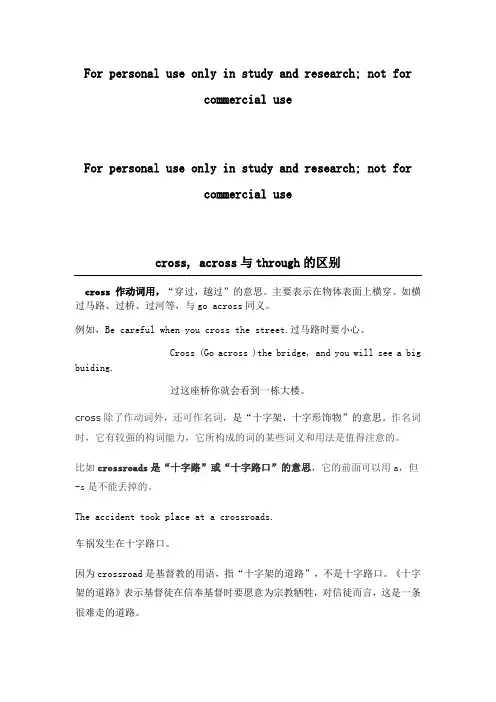
For personal use only in study and research; not forcommercial useFor personal use only in study and research; not forcommercial usecross, across与through的区别cross 作动词用,“穿过,越过”的意思。
主要表示在物体表面上横穿。
如横过马路、过桥、过河等,与go across同义。
例如,Be careful when you cross the street.过马路时要小心。
Cross (Go across )the bridge, and you will see a big buiding.过这座桥你就会看到一栋大楼。
cross除了作动词外,还可作名词,是“十字架,十字形饰物”的意思。
作名词时,它有较强的构词能力,它所构成的词的某些词义和用法是值得注意的。
比如crossroads是“十字路”或“十字路口”的意思,它的前面可以用a,但-s是不能丢掉的。
The accident took place at a crossroads.车祸发生在十字路口。
因为crossroad是基督教的用语,指“十字架的道路”,不是十字路口。
《十字架的道路》表示基督徒在信奉基督时要愿意为宗教牺牲,对信徒而言,这是一条很难走的道路。
另外,crossing是“渡口”、“横道线”或“(铁路与公路的)交叉点”。
The Star Ferry Pier is a ferry crossing in central.天星码头是在中环的一个渡口。
All car should stop at the zebra crossing.所有车辆都要在斑马线前停下。
A bus ran into a train at the level/grade crossing.一辆公共汽车在平交点与火车相撞。
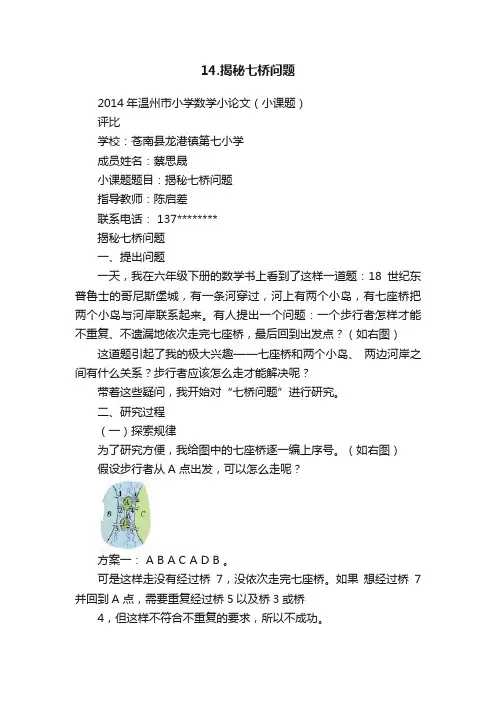
14.揭秘七桥问题2014年温州市小学数学小论文(小课题)评比学校:苍南县龙港镇第七小学成员姓名:蔡思晟小课题题目:揭秘七桥问题指导教师:陈启差联系电话: 137********揭秘七桥问题一、提出问题一天,我在六年级下册的数学书上看到了这样一道题:18世纪东普鲁士的哥尼斯堡城,有一条河穿过,河上有两个小岛,有七座桥把两个小岛与河岸联系起来。
有人提出一个问题:一个步行者怎样才能不重复、不遗漏地依次走完七座桥,最后回到出发点?(如右图)这道题引起了我的极大兴趣——七座桥和两个小岛、两边河岸之间有什么关系?步行者应该怎么走才能解决呢?带着这些疑问,我开始对“七桥问题”进行研究。
二、研究过程(一)探索规律为了研究方便,我给图中的七座桥逐一编上序号。
(如右图)假设步行者从A 点出发,可以怎么走呢?方案一: A B A C A D B 。
可是这样走没有经过桥7,没依次走完七座桥。
如果想经过桥7并回到A 点,需要重复经过桥5以及桥3或桥4,但这样不符合不重复的要求,所以不成功。
方案二: A B D A C A B 。
同样也是没有经过桥7,没依次走完七座桥。
如果要经过桥7并回到A 点,必将重复,所以不成功。
方案三: A D C A B A C 这样走没有经过桥5,没依次走完七座桥。
如果经过桥5并回到A 点,需要重复经过桥7以及桥1或桥2,还是不成功。
……我把假设步行者从A 点出发的能想到的方案都进行了尝试。
在每次尝试中,我发现始终都有一座桥没有经过。
如果要经过所有的桥并回到起点,步行桥1 桥2 桥3 桥4 桥6 桥5 桥2 桥5 桥6 桥4 桥3 桥1桥6 桥7 桥4 桥2 桥1 桥3者需要重复走过某些桥,所以不能不重复、不遗漏地依次走完七座桥,最后回到出发点。
我按照以上的方法又研究了假设步行者从B、C、D点出发的情况,均不成功。
诶,奇怪了!我已经把所有的点研究了一遍,为什么不管从哪一点出发,都不能不重复、不遗漏地依次走完七座桥,最后回到出发点呢?我百思不得其解。
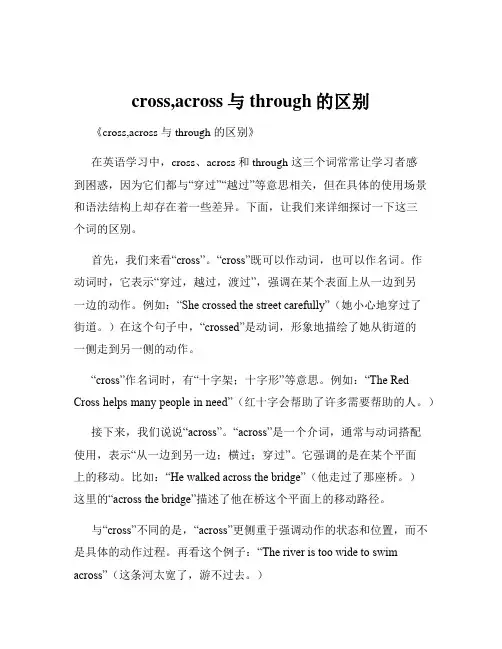
cross,across与through的区别《cross,across 与 through 的区别》在英语学习中,cross、across 和 through 这三个词常常让学习者感到困惑,因为它们都与“穿过”“越过”等意思相关,但在具体的使用场景和语法结构上却存在着一些差异。
下面,让我们来详细探讨一下这三个词的区别。
首先,我们来看“cross”。
“cross”既可以作动词,也可以作名词。
作动词时,它表示“穿过,越过,渡过”,强调在某个表面上从一边到另一边的动作。
例如:“She crossed the street carefully”(她小心地穿过了街道。
)在这个句子中,“crossed”是动词,形象地描绘了她从街道的一侧走到另一侧的动作。
“cross”作名词时,有“十字架;十字形”等意思。
例如:“The Red Cross helps many people in need”(红十字会帮助了许多需要帮助的人。
)接下来,我们说说“across”。
“across”是一个介词,通常与动词搭配使用,表示“从一边到另一边;横过;穿过”。
它强调的是在某个平面上的移动。
比如:“He walked across the bridge”(他走过了那座桥。
)这里的“across the bridge”描述了他在桥这个平面上的移动路径。
与“cross”不同的是,“across”更侧重于强调动作的状态和位置,而不是具体的动作过程。
再看这个例子:“The river is too wide to swim across”(这条河太宽了,游不过去。
)然后,我们来了解“through”。
“through”同样是一个介词,它表示“穿过;通过;从一端到另一端”,但与“across”不同的是,“through”强调的是在一个立体的空间或一个时间段内穿过。
例如:“The train goes through the tunnel”(火车穿过隧道。
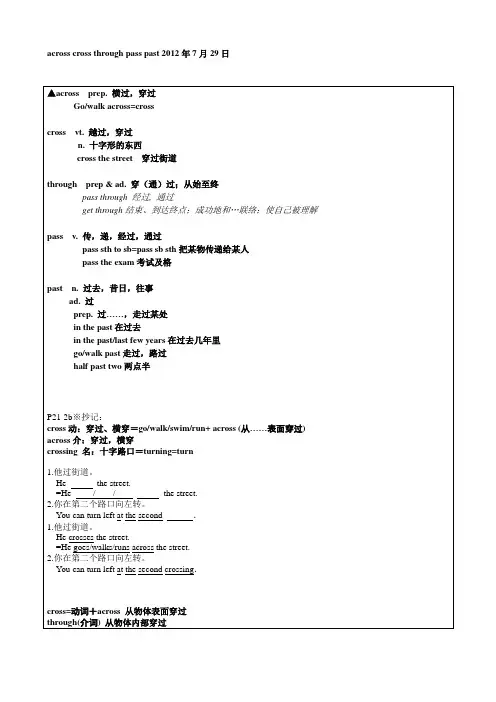
across cross through pass past 2012年7月29日cross/across throughcross(=动词+across)the road/street/bridge/river/square(广场)through the gate/door/ window/ wall/forest/field/hole(洞)练习:1.走过桥去。
_ the bridge._ the bridge.2.学生们同王大伯一起穿过了大门。
The students the gate with Uncle Wang. ----------------------------------------------------------------------3.他迅速穿过了街道/中华路。
He the street/Zhonghua Road quickly.= He the street/Zhonghua Road quickly.4.我认为过河很危险。
I think it’s dangerous to the river.=I think it’s not safe to the river.5. 小偷是从窗户进来的。
The thief came in the window.6. 次日他穿过了森林。
He the forest the next day.7. 这条小溪流过我们屋后的田地。
The stream the field behind our house.答案:1.走过桥去。
Cross the bridge.Go across the bridge.2.学生们同王大伯一起穿过了门。
The students walked through the gate /door with Uncle Wang. ----------------------------------------------------------------------3.他迅速穿过了街道/中华路。
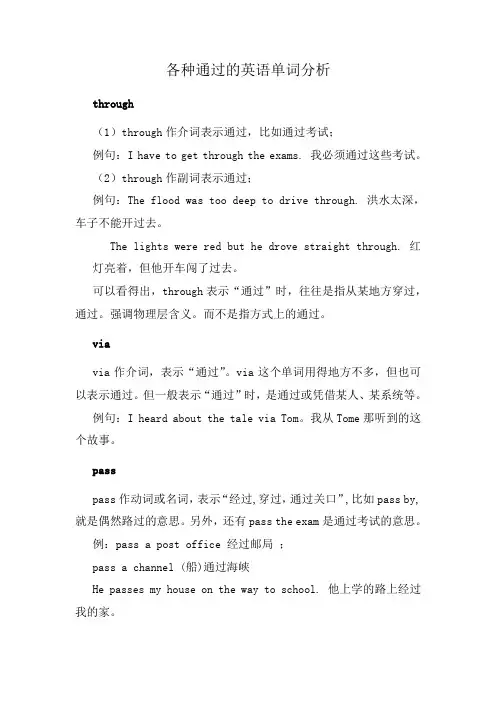
各种通过的英语单词分析through(1)through作介词表示通过,比如通过考试;例句:I have to get through the exams. 我必须通过这些考试。
(2)through作副词表示通过;例句:The flood was too deep to drive through. 洪水太深,车子不能开过去。
The lights were red but he drove straight through. 红灯亮着,但他开车闯了过去。
可以看得出,through表示“通过”时,往往是指从某地方穿过,通过。
强调物理层含义。
而不是指方式上的通过。
viavia作介词,表示“通过”。
via这个单词用得地方不多,但也可以表示通过。
但一般表示“通过”时,是通过或凭借某人、某系统等。
例句:I heard about the tale via Tom。
我从Tome那听到的这个故事。
passpass作动词或名词,表示“经过,穿过,通过关口”,比如pass by,就是偶然路过的意思。
另外,还有pass the exam是通过考试的意思。
例:pass a post office 经过邮局;pass a channel (船)通过海峡He passes my house on the way to school. 他上学的路上经过我的家。
crosscross,动词,侧重于横穿,一般表示横穿过什么并与其成十字状态,通过时有交叉的意思。
比如过马路,过河。
例句:He crossed the road. 他横穿那条马路。
acrossacross 是由cross变过来的,意思一样,只是词性不同,across 是介词,指在表面通过或穿过,如通过街道,河流,桥梁等。
动词+across=cross例句:A dog swam across the river. 狗游过了河He jumped across the the ditch. 他跳过那条沟。
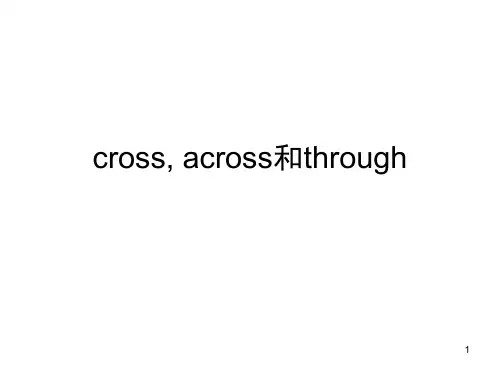
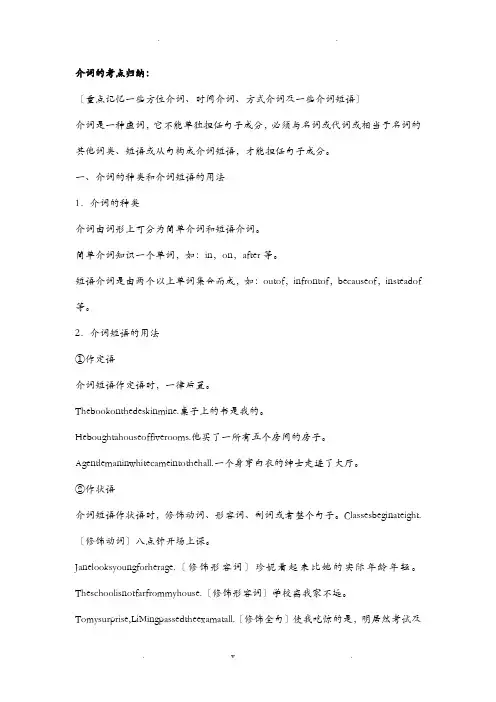
介词的考点归纳:〔重点记忆一些方位介词、时间介词、方式介词及一些介词短语〕介词是一种虚词,它不能单独担任句子成分,必须与名词或代词或相当于名词的其他词类、短语或从句构成介词短语,才能担任句子成分。
一、介词的种类和介词短语的用法1.介词的种类介词由词形上可分为简单介词和短语介词。
简单介词知识一个单词,如:in,on,after等。
短语介词是由两个以上单词集合而成,如:outof,infrontof,becauseof,insteadof 等。
2.介词短语的用法①作定语介词短语作定语时,一律后置。
Thebookonthedeskinmine.桌子上的书是我的。
Heboughtahouseoffiverooms.他买了一所有五个房间的房子。
Agentlemaninwhitecameintothehall.一个身穿白衣的绅士走进了大厅。
②作状语介词短语作状语时,修饰动词、形容词、副词或者整个句子。
Classesbeginateight.〔修饰动词〕八点钟开场上课。
Janelooksyoungforherage.〔修饰形容词〕珍妮看起来比她的实际年龄年轻。
Theschoolisnotfarfrommyhouse.〔修饰形容词〕学校离我家不远。
Tomysurprise,LiMingpassedtheexamatall.〔修饰全句〕使我吃惊的是,明居然考试及格了。
③作表语Heisindanger.他处于危险之中。
Weareagainst/foryou.我们反对/支持你。
Itwasbecauseoftheheavyrain,wecouldn’tgoout.因为这场大雨,我们出不去了。
④作宾语补足语Makeyourselfathome.放松一些,就和在你自己家一样。
Wemadehimoutofdanger.我们使他脱离了危险。
二.表示时间的介词表示年、月、日、时刻等用at,in,on表示时间的前后用in,before,after表示期限等用by,until,till表示期间等用for,during,through表示时间的起点等用from,since表示时间的经过等用in,within1.at、in、on用在时间上的区别:A. at + 钟点/时间点/时间某一时刻(at 9:00, atlunch, atbreakfast, atnoon, at night, atthattime,atthemoment)B. in + 某年/某月/某年某月/某个季节/某个世纪/泛指的早上/下午/晚上inthemorningintheafternoonintheeveninginthe21stcenturyinSeptember ;inMayin1995intheholidayinsummerC. on + 日期/星期/具体的某一天/ 具体的某一天的上午、下午、晚上onMondayonTuesdaymorningonMay4thonacoldnighton a sunny morningonthenightofJuly〔the〕first在七月一日的夜晚注意:表示时间的名词前有this,last,next,every等修饰时,其前面不加介词。

through和by作为通过的区别
by⼀般是讲通过的⽅式⽅法,例如:by bus ,by car等等;through是通过什么、经由等,如:He succeeded through hard work。
through和by作为通过的区别
through表⽰“通过”,⼤家都⽐较熟悉。
⽐如go through the park(穿过/通过公园),push through the crowds(通过⼈群),在这⾥表⽰“通过”,则是真的是从地理⽅位上横穿过去。
今天我们要讲的内容是“通过某⽅式”,使⽤的是“通过”的转义,通过某⼈或某媒介,通过某种⾏为的意思。
by表⽰“通过……⽅式”的⽤法
by⼀般在使⽤时,表⽰着“通过某⼿段或⽅法”的意思。
[例句]
I can keep in touch with friends and family by using WeChat.
通过使⽤微信我能与朋友和家⼈保持联系。
[例句]
By reading, we can broaden our horizon.
通过阅读,我们可以扩⼤视野。
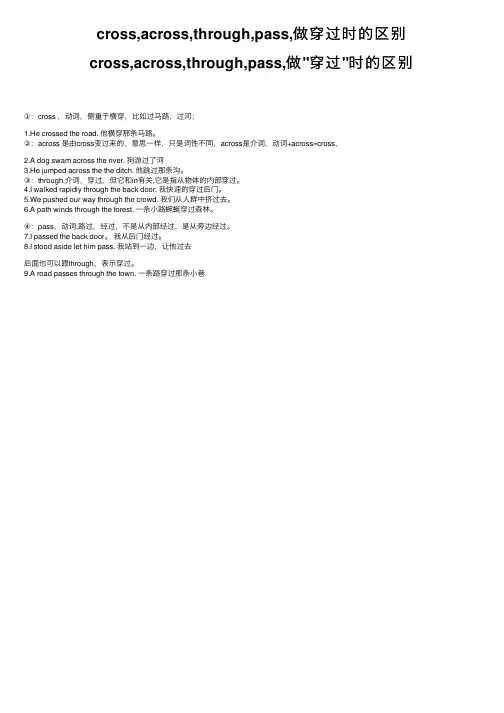
cross,across,through,pass,做穿过时的区别
cross,across,through,pass,做"穿过"时的区别
①:cross ,动词,侧重于横穿,⽐如过马路,过河;
1.He crossed the road. 他横穿那条马路。
②:across 是由cross变过来的,意思⼀样,只是词性不同,across是介词,动词+across=cross,
2.A dog swam across the river. 狗游过了河
3.He jumped across the the ditch. 他跳过那条沟。
③:through,介词,穿过,但它和in有关,它是指从物体的内部穿过。
4.I walked rapidly through the back door. 我快速的穿过后门。
5.We pushed our way through the crowd. 我们从⼈群中挤过去。
6.A path winds through the forest. ⼀条⼩路蜿蜒穿过森林。
④:pass,动词,路过,经过,不是从内部经过,是从旁边经过。
7.I passed the back door。
我从后门经过。
8.I stood aside let him pass. 我站到⼀边,让他过去
后⾯也可以跟through,表⽰穿过。
9.A road passes through the town. ⼀条路穿过那条⼩巷。
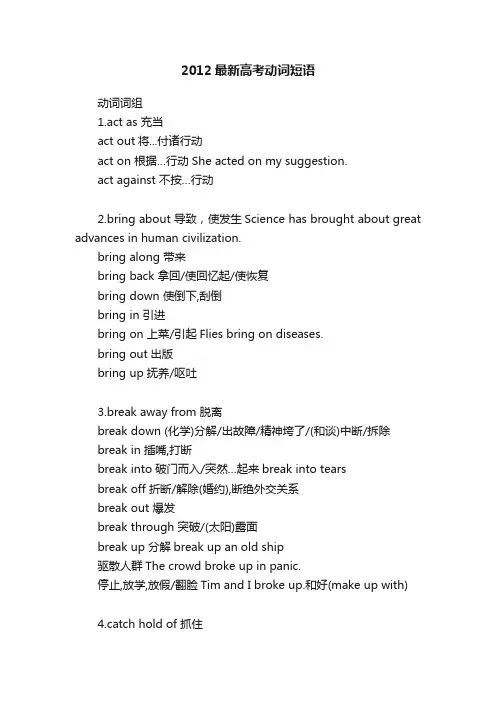
2012最新高考动词短语动词词组1.act as 充当act out将...付诸行动act on 根据…行动 She acted on my suggestion.act against 不按…行动2.bring about 导致,使发生Science has brought about great advances in human civilization.bring along 带来bring back 拿回/使回忆起/使恢复bring down 使倒下,刮倒bring in 引进bring on 上菜/引起Flies bring on diseases.bring out出版bring up 抚养/呕吐3.break away from 脱离break down (化学)分解/出故障/精神垮了/(和谈)中断/拆除break in 插嘴,打断break into 破门而入/突然…起来break into tearsbreak off 折断/解除(婚约),断绝外交关系break out 爆发break through 突破/(太阳)露面break up 分解break up an old ship驱散人群The crowd broke up in panic.停止,放学,放假/翻脸Tim and I broke up.和好(make up with)4.catch hold of 抓住catch sb. doing 发现某人做某事catch cold 感冒catch a fever 发烧catch on勾住Her dress caught on a nail.catch up 赶上catch a word 听清catch one’s attention 引起注意catch one’s breath 屏住呼吸/doc/2316765519.html,e about 发生come across 偶遇come after 追随come at 袭击come into sight 看到come off (纽扣,齿,发,油漆)掉come on 加油come out 开花/出版/结果是come to 合计/苏醒/谈到come up 发芽come up to 达到come up to 100/达到标准,不负所望come up to one’s expectation come up with 想起6.carry on 继续开展carry out 执行carry through 完成carry through the work7.call at 拜访某地call in 召集call off 取消call up 打电话/应征入伍/使某人想起call for 需要/用车接/去取包裹call on 拜访某人8.cut down 削减cut in 插嘴cut off 切断/隔离feel cut offcut out删除cut short 打断某人说话cut up 切碎/难过cut in half切半9.do away with废除do for 完蛋do up 包扎,扣纽扣,梳头,打扮do with 对待/相处do without 没有..也行 I can manage without you.10.drop in at 拜访某地drop in on 拜访某人drop out 退学drop sb. A line 写封短信drop behind 落后drop a bad habit 改掉坏习惯11.die away 声音,风,光等渐弱die down 情绪,战斗,火等平息die from 死于事故,伤口等die of 死于疾病,情感,年龄,饥寒die off 先后死去die out 灭绝12.fall behind 落后fall down 跌到fall over 向前摔倒fall off 减少13.get caught in 被困住get across 使人了解get along 进展/相处get around 消息传开/走动/说服,哄骗get at 了解 The meaning is difficult to get at.get away 脱身get down 取下/下车/写下/使沮丧get down to 开始认真对待get in 收获/插话get off 下车/脱掉/避开Get off the grassget on 上车/穿上/进展/相处get out 离开/摆脱/泄露/出版get over 爬过墙等/克服困难问题等/恢复健康get through 及格/接通电话/度过/完成get up 起床,起立/变大,加快速度The wind is getting up.14.go about 着手做某事/四处走动go after 追求/追捕go against 反对go ahead 向前走/请做吧go all out to do 全力以赴go around 四下走动/流传News of this kind goes around quicklygo back 追溯 date back togo in for 参加比赛,考试等go off 离开go on 继续go out 出去/熄灭go over 检查,核对/复习go through 穿过/用完The man went through all his savings./经历,受苦go with与相配Her red blouse goes well with her black skirt.The cassette goes with the bookgo without 没有..也能忍受15.give away 捐献/泄露(机密)give birth to 生孩子/产生give in 上交/屈服give off 发出(烟气味)give oneself to 沉溺于The scientist gave himself to his experiments.give out 分发/用完The food gave out./发出气味,声音give rise to 引起 What has given rise to your crazy idea?give way 让步/为..替代/支持不住Her health gave way.give up 放弃16.hold back 阻止 No one can hold back the wheel of history.hold on (打电话时用语)请等一下,不要挂上/坚持= hold out hold on to 抓住/坚持hold out 伸出He held out his hand.hold up 举起(手,伞)/交通阻塞We’ve been held up by a heavy foghold water 有道理your argument doesn’t hold water17.hand down 传给后代 (= hand on, pass down)hand in 上缴hand on 传下去hand out 分发hand over 移交hand around 传递18.keep away from 避开keep back 阻挡/隐瞒He can keep nothing back from his friends. /克扣钱财keep off避开;不接近Keep off the grass!keep on继续;保持keep out关在门外;不准入内to keep the smoke outkeep up保持;维持Keep up your courage.keep up with跟上19.look back upon回想,记起look down upon轻视,看不起look forward to盼望;期待I'm looking forward to seeing you this summer vacation.look into调查look on旁观/看作 (= look upon)look out当心look through仔细检查,翻阅look up 好转Things are looking up!在书中查到When you do not understand a word, you can look it up in this dictionary.探访(某人)On my way home, I looked up an old friend of mine.look up to尊敬look after照料look over翻阅,浏览look sb. Up and down 上下打量look sb. in the face直视某人20.leave alone让某人独自呆着leave behind 留下leave out 省略leave word 留言21.let down 使..失望let in 让…进来/改小(衣服)let out 发出/泄露/放宽(衣服)/出租(车、马等)let alone更不用说He hasn't enough money for food, let alone amusements.let go放开,松手22.make a difference产生不同,有关系make believe 假装make sense有道理make for造成,有利于The large print makes for easier reading.make from 由..制成make into制成make off匆匆逃走make out 弄清楚make up和解;和好/化妆;化装/,虚构(故事、诗等)/弥补/组成make up for补偿make up for lost time补回失去的时间make up to奉承;献媚If you work hard, you will make a good sailor. (指好的方面)成为如果你肯努力,你将成为一个好水手。
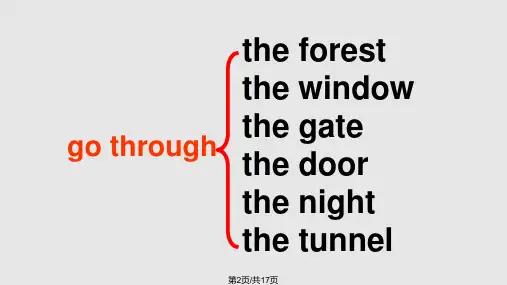
cross、across、through、pass、past的区别cross 、across、through、pass、past的区别举例1首先,分清这几个的词性1,cross, pass是动词,cross作动词用,有横过、交叉的意思Don't cross your legs。
不要交叉双腿。
pass为动词,经过, 穿过, 渡过pass by 指走过,路过,pass a post office 经过邮局它也有传递,如:pass a book to me.递给我一本书。
2,across, through, over通常作介词或副词,across 是“横穿、横过、横渡、横跨”与“道路”交叉形成“十字”。
指在平面上掠过,go across the street “穿过大街”across还有对面的意思,在/到……对/面,如across the roadthrough通过, 穿过, 经过, 遍及, 贯穿(有从物体内部穿过的意思,比如隧道)也是指在立体空间中的“穿过”。
表示“贯通、透过、穿过”,即是从一头贯穿到另一头如:go through the forest“穿过森林”,例The river runs through our city.这条河流经我们市。
也可以表达较抽象的意思,通过某个过程,通过某个经历,over: 翻越过侧重于从物体的上方过,高于,超过,the bridge over the river(穿过河上方的桥),she is over forty(她已经超过40岁了), across和over两者都表示从一侧向另一侧的运动:但如果越过的是一个高的物体用over: He climbed over the wall.如果越过的是一个平面,则宜用across:3,past一般是名词。
指过去,往事,搭配如in the past(在过去),miss the past (想念过去)crossing名词“渡口”、“横道线”或“(铁路与公路的)交叉点”。
CROSS七步法详解迅速有效的解决cross问题是⼀个⽐较难的问题,没有公式,只能根据实践和经验,初学者很难看到解决cross的最少步骤,更不要说执⾏的最佳途径了,在此,想为⼤家讲下建⼗字的⼀些技术,后⾯有三个例⼦,讲解的很详细,但是不要期望⼀天就能全部熟练掌握。
分析表明,所有的cross都可以在⼋步内完成,⽽且99.95%的都是在五六七步内就完成了,所以如果你每次都能看到最短路径或者接近最短路径的⽅法,并且能较快的转动,那么在⼀两秒内完成CROSS就是⼀件可能的事情。
⾸先,cross应该在底⾯完成,如果你是顶⾯完成的话,赶紧改过来,因为在底⾯完成的优点有,⼀,顶层视⾓宽阔,便于⾸组F2L观察,⼆,F2L时不需要翻转魔⽅,节省时间,有的⼈为了转动顺⼿在左⾯完成cross,这不在本⽂的考虑⽅⾯。
其次,要知道你的魔⽅的配⾊,尤其是对⽴⾊,我⽤的是上黄,下⽩,前红,后橙,左蓝,右绿,也就是你起码要知道红对橙,蓝对绿,最好顺序也记住。
⽐如下⾯四个图,你应该很快知道通过D转,这四个图都是⼀样的cross完成状态。
我们把棱块分为两类(我定义的不准确,只是为了下⾯解释⽅便⽽已)⼀,“正确块”,通过⼀次转动(或者不需转动)就可以把⽩⾊转到底⾯,这样的棱块叫“正确块”正确块共有四种,⼀是棱块在顶层且⽩⾊朝上,⼆是棱块在中层⽩⾊朝左,三是棱块在中层⽩⾊朝右,四是棱块在底层且⽩⾊朝下。
如下⾯三个图中的蓝⽩棱块,都是⼀步就可以下底,所以是正确块。
⼆,“错误块”,通过两次转动才可以把⽩⾊转到底⾯,这样的棱块叫“错误块”错误块共有两种,⼀是棱块在顶层且⽩⾊朝侧⾯,⼆是棱块在底层且⽩⾊朝侧⾯,如下⾯两个图中的蓝⽩块,都最少需要两步才可以下底,所以是错误块。
下⾯介绍⼀个最重要的定律,三⾊定律,此定律在CROSS的过程中应⽤⼗分普遍,必须熟练掌握,下⾯通过⼏个问题来⼀步步阐述。
第⼀个问题(看下图)如果我转⼀个R,那么底棱的相对位置正确吗?很容易可以看出,这是不正确的,因为绿⽩棱块对红中⼼块,红⽩棱块对绿中⼼块,对准红的,绿⽩棱块就跑对⾯蓝中⼼块去了,对准绿的,红⽩棱块就跑对⾯橙中⼼块去了,即两⾊=错误第⼆个问题(看下图),如果我转F2,那么底棱的相对位置正确吗?这次不太容易看,我们⽤三⾊定律,我们看到了三种颜⾊,蓝⽩棱块连着红中⼼块,红⽩棱块连着绿中⼼块,我们把这四个块分为交叉两组,可以看出两组分别是相同⾊(两个红)和对⽴⾊(⼀绿⼀蓝),三⾊=正确,所以我们转F2是对的。
经过英语短语
经过的英语:pass。
详细释义:
v.经过,越过;前行,穿过;使穿过;传递,传送;传达(信息);传(球);(所有权)转移,转让;转变,转化;交流,交换;(数量上)超过,突破n.出入证,通行证;及格,合格
词组短语:
pass through 穿过…;通过…
come to pass 实现;发生
pass on 传递;继续;去世
pass by 经过;走过;逝去
词语辨析:
elapse,pass这组词都有“过去,消逝”的意思,其区别是:
elapse书面用词,指时间等不知不觉地逝去,含义比pass窄,常常侧重从某一特定时间到另一特定时间的过去。
pass最普通常用词,指岁月的流逝,某些自然现象或事情的过去。
侧重其结果。
- 1 -。
Pass的用法及固定搭配一级段落标题:Pass的基本用法介绍Pass是英语中常用的动词,它有许多不同的意思和搭配。
在本文中,我们将重点介绍Pass作为动词时的几种常见用法和固定搭配。
二级段落标题1:通过或经过某地在许多情况下,Pass被用来表示通过或经过某个地方。
例如:“I pass by your house every morning on my way to work.”(我每天早上上班路上都会经过你家。
)这句话表达了一个每天发生的动作,即通过对方家门口。
另一个例子是:“We passed through a beautiful town on our road trip.”(我们在公路旅行中经过了一个美丽的小镇。
)这里使用了“pass through”一词组合,表示途中穿越或经过一个城镇。
此外,“pass”还可以表示越过某个障碍物或边界,如:“The hikers passed over the mountain range and reached their destination.”(徒步旅行者们越过山脉到达了目的地。
)这个句子描述了他们成功穿越山脉并到达目标地点。
二级段落标题2:传递信息或物品除了表示通过某个地方之外,Pass还可以用于传递信息或物品。
例如:“Please pass the salt.”(请递给我盐。
)这里使用了“pass”一词,表示将物品传递给对方。
在工作环境中,人们也常使用“pass”来指代转交信息或文件的行为。
例如:“I will pass your message along to the team.”(我会把你的消息转达给团队。
)这句话表明了一个人接收到信息并将其传达给其他人的过程。
二级段落标题3:通过考试或评估Pass还可以用来表示通过考试、测试或评估。
例如:“She finally passed her driving test on her third attempt.”(她第三次终于通过了驾驶考试。
「经过、顺道拜访、短暂拜访」英文怎么说?gobystopbypassby英文用法与英文例句解说!要如何用英文表达你「经过」某个地方呢?跟「经过、顺道拜访、短暂拜访」某地相关的英文片语有go by、pass by跟stop by。
以下说明如何用英文表达你「经过、顺道拜访、短暂拜访」某个地方,赶快学起来,下次就能派上用场囉!1. go by 短暂拜访go by本身有短暂拜访的意思。
例:My sister was not at home when I went by yesterday. 昨天我短暂拜访时我姐不在家。
2.pass by 经过、短暂拜访pass by有经过的意思,而且通常指没有停下来。
例1:A black car passed by when I looked out the window.当我往窗外看的时候,一辆黑色的车经过。
例2:My father was just passing by when he saw the car accident. 当我爸看到这场车祸时他刚好经过。
3.stop by 短暂拜访、顺道拜访、顺路拜访stop by 有顺道拜访的意思,stop by 后面会接某地、某处,stop by的重点在于「顺道」,当我们说某人stop by的时候,通常代表他本来要去某个地方,因为刚好顺路,所以顺便去了另外一个地方。
例1:I’ll stop by the supermarket on my way home. 我回家会顺道去一下超市。
例2:She Stopped by the convenience store on the way to the library. 她去图书馆路上去了一下便利商店。
go by, go by 中文, go by 意思, go by 片语, go by 用法, go by 翻译, go by 英文, go by 英文例句, go by 英文片语, pass by, pass by 中文, pass by 例句, pass by 意思, pass by 片语, pass by 用法, pass by 翻译, pass by 英文例句, pass by 英文片语, stop by, stop by 中文, stop by 例句, stop by 意思, stop by 片语, stop by 用法, stop by 翻译, stop by 英文例句, stop by 英文片语, 刚好经过英文, 拜访英文, 短暂拜访英文, 经过英文, 经过英文例句, 经过英文片语, 经过某地英文, 顺路拜访英文, 顺道拜访英文, 顺道经过英文。
七个经过” pass, cross, through, by……
怎么过(有何区别)
这7个表”经过“的词中,除pass, cross是动词外,其它都是介词(副词)。
首先,我们从词性上去区别它们。
充当谓语动词时用pass, cross, 不充当谓语动词时用past, across, through, over, by从旁边“经过”“绕过” “路过”用pass (介词形式为past), 从表面“越过”用cross(介词形式为across)img src=/large/pgc-image/15251329904161dc24 05d4e img_width=474 img_height=266 alt=七个经过”= pass,= cross,= through,= by……怎么过(有何区别)= inline=0 style=box-sizing: border-box; -webkit-tap-highlight-color: transparent; border-style: none; max-width: 100%; display: block; margin: 10px auto;
Light goes through the window
不充当谓语时,几个介词“经过”的区别
past从旁边“经过”“路过”“绕过”by从旁边“经过”“绕过”“绕过”(此时by=pst)across 从表面“经过” , 空中“越过”(比如把东西从房间的一边扔到另一边)over 1. 从上方“经过”“飞过” “跨过”;2.从表面“经过”“越过”(此时over=across)through从内部“穿过”为何以上单词用法孩子们不容易分得清,而“man和child却不可能弄错?因为前者的汉语意思相
同,而后者汉语意思相距甚远。
这就给我们启示,我们尽可能将单词的用法区别在它们的汉语释义上体现出来,以便孩子们像记man和child一样只要记得意思就不会弄错。
因此我们把past,by的意思记为“绕过”,across记为“越过” (=over),over“跨过”(“越过”时=across),through记为“穿过”,这样记住意思就知道用法区别了。
你还可以编成口诀辅助记忆:
through穿过over跨,越过over, across(s不念出以便押韵),从旁路过by和past(st不念出就押韵了)用上面讲到的词完成下列练习:
1. He _______the shop and bought some food.
2.He is walking _______the bridge.
3. The sheep jumped______the fence(栅栏) and ran away.
4. A man _______the street and stopped at a shop.
5. The birds flew(fly的过去式)_______the forest.
6. The children walked ________the forest.
7. A car drove_______the airports.。